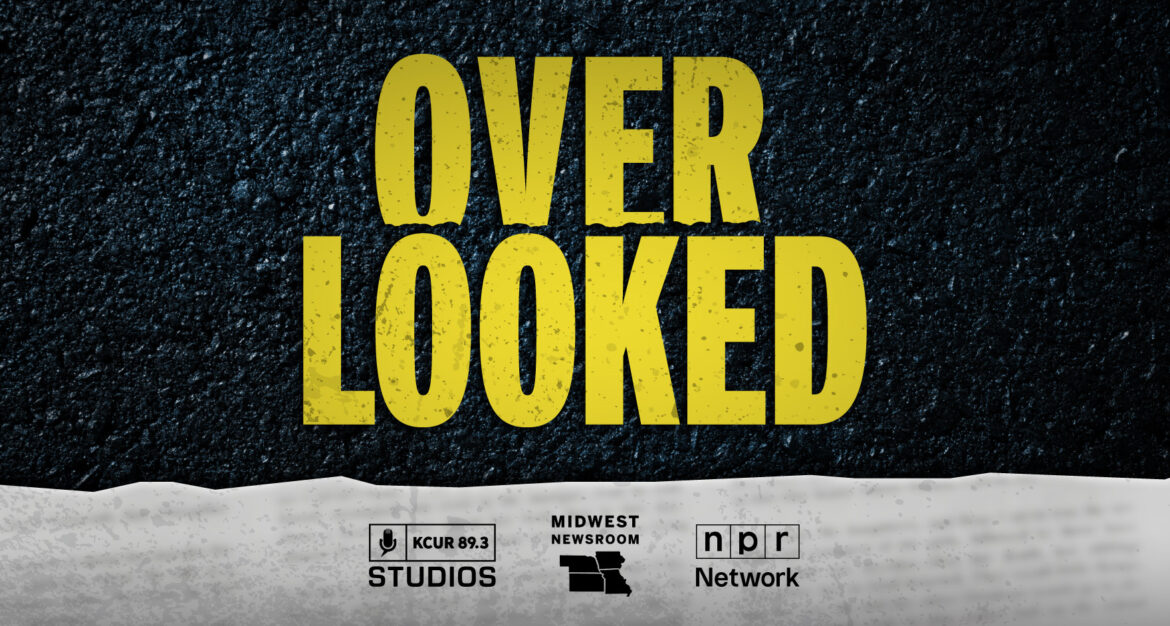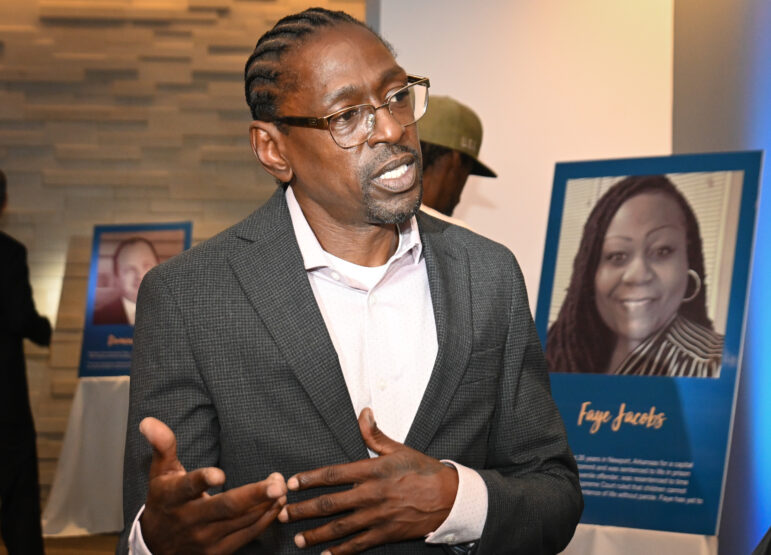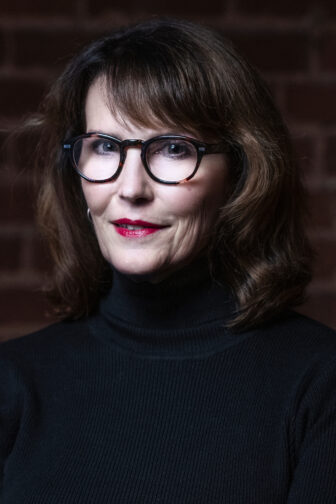KCUR aims for new audiences with its first investigative podcast, ‘Overlooked’

KCUR investigative reporter Peggy Lowe was deep into an on-air membership drive shift one Thursday morning when her phone started buzzing. Sources were trying to tell her that the FBI had just arrested Roger Golubski, a retired detective who had spent decades on the police force for Kansas City, Kan.
Lowe had reported on Golubski for years since his implication in the wrongful 23-year imprisonment of Lamonte McIntyre, who was released in 2017. Golubski’s arrest on charges of sexual assault and kidnapping was a huge story. The veteran journalist and her colleagues jumped into action to cover the development.
“We all were chasing it that day,” said Lowe, whose editor remembers her pulling a 14-hour day. To complicate matters, KCUR was just a month out from the planned release of a six-part narrative podcast investigating Golubski’s misconduct during his time on the police force.
Lowe told CJ Janovy, KCUR’s director of content-journalism, that the podcast had to air as soon as possible. Producers Mackenzie Martin and Suzanne Hogan quickly prepared a trailer, which dropped the following Tuesday. Lowe, her editor and her co-reporters, Dan Margolies at KCUR and Steve Vockrodt from NPR’s KCUR-based Midwest Newsroom, turned their attention to the completed scripts, which now lacked crucial information.
“We did do quite a bit of rewriting on each episode, and it blew up episode six,” Lowe said.
The team pulled off the revision, and Overlooked debuted Oct. 4. “There was definitely a moment of panic, but it was also exciting to see this accountability that activists and various public officials have been asking for unfolding in real time,” said Martin.
Overlooked is KCUR’s first effort to reach a national audience with a podcast meant to appeal to listeners well beyond the Kansas City metro area. “This is a story for anybody who cares about justice and cares about … holding people to account,” said Holly Edgell, managing editor for the Midwest Newsroom, which includes stations in Kansas, Missouri, Iowa and Nebraska.
A full-time job
The podcast begins the same way KCUR’s reporting on Golubski began: with the exoneration of Lamonte McIntyre. McIntyre was 17 years old when he was arrested for a double murder. Despite a lack of evidence and witness testimony to the contrary, McIntyre was convicted and sent to prison. Detective Roger Golubski had investigated the case, and in a 2018 federal lawsuit, McIntyre’s mother alleged Golubski had threatened and made sexual advances toward her. The suit also alleged that Rosie McIntyre was not the only woman Golubski preyed upon and that he had exploited vulnerable Black women in the community he policed since the early 1980s.
“He would often fixate on particular women, harassing them continually for months or even years,” wrote U.S. District Judge Kathryn H. Vratil in a 2020 decision declining to throw out most of the charges the McIntyres brought against Wyandotte County, Kan. “These predilections and abuses were well known among other officers and supervisors within the department.”

That was around the time Lowe began to speak with sources, and it quickly became clear that there was more to the story than a single piece or even a series of on-air features. KCUR had never attempted an investigative podcast, but it seemed the best format for presenting Lowe’s reporting about Golubski and the allegations that he routinely intimidated and assaulted witnesses during his decades on the police force.
“There were mountains of tape … 30 years’ worth of stories of individual people in Kansas City, Kansas, and what increasingly looks to be systemic problems with law enforcement in Kansas City, Kansas,” said Janovy, who rejoined KCUR last summer, about a year after discussions about the podcast began. “What became apparent to me pretty immediately was that we needed to figure out how to focus the narrative.”
It was also apparent to Janovy that if they were going to do this podcast, Lowe had to make it her singular focus.
“She said, ‘Okay, we’re going to put you on this full time,’” said Lowe. “I was absolutely shocked. In the 30 years I’ve been in journalism, it’s like bosses always come up with these big ideas … and you get to do that while you’re doing all your daily work.”
Janovy brought on board two producers from KCUR Studios, the station’s podcast arm, and enlisted the help of NPR’s Midwest Newsroom, where former Kansas City Star reporter Steve Vockrodt had just signed on as investigative editor.
One of Overlooked’s early champions was Chris Haxel, the Pulitzer Prize–winning co-host of No Compromise, who was based at KCUR at the time. No Compromise was a combined effort of NPR, KCUR, WABE in Atlanta and the reporting collaborative Guns & America. The experience taught Haxel a good deal about what it takes to produce a podcast.
“I was serving as news director the summer they were getting that together,” said Lowe. “Chris, I would see him late at night, early in the morning in the station, and he just looked like shit.”
Janovy said the team behind Overlooked has a running joke they lean on when things take longer than expected: “Haxel warned us.”
“The best podcasters and the best producers and reporters make [podcasting] seem very easy,” said Edgell. “It’s a really heavy lift.”
Edgell said giving Lowe the time she needed to report was particularly important with this story.
“If you’re doing an investigative podcast where you’re centering narratives that are around the people who were harmed, you need to go to those people, sit with those people, spend time with those folks, get to know them, earn trust,” she said.
Investigative reporting isn’t a nine-to-five job, said Lowe. “If they want to talk in the evenings, I’m there. If they want to talk on the weekends, I’m there. If they want to go to breakfast, I’m there,” she said. “We just have to take that time.”
The Overlooked team is small. Martin and Hogan produce the show while also handling all their other responsibilities as part of KCUR Studios. Janovy serves as editor, and Lowe is primary reporter and host, with reporting help from Margolies and Vockrodt.
But when a station tackles a project of this magnitude, it doesn’t only impact staff that are directly involved. Taking a reporter off of daily news for a year has ripple effects.
“The luxury that I’ve had in all this time to do this reporting was only made possible because other reporters stepped up and did the work, and my news director [Lisa Rodriguez] juggled the work and the scheduling,” Lowe said. “I might be the figurehead here, [but] so many people within the newsroom pitched in on this.”
Finding an audience
As the podcast industry grows, more public media stations are getting into the game. But matching resources to ambitions has long been a challenge, particularly for small and mid-sized stations. Podcasting requires a particular infrastructure of staffing, software and workflows that differs from the needs of radio production.
KCUR Studios was developed to create that infrastructure and to “innovate, experiment, engage untapped audiences, expand on stories that our broadcast clock doesn’t allow time for,” said Audience Development Director Geneviève Des Marteau. Offerings include the daily news podcast Kansas City Today, the history show A People’s History of Kansas City, and the food-centric Hungry for Mo. The idea is not only to create new content for a public radio audience but to tap new audiences — and revenue streams — for KCUR.
Overlooked marks the first investigative collaboration between the newsroom and KCUR Studios, and it’s been a learning experience.
“This is new territory for most of our newsroom,” said Des Marteau. “Our newsroom does phenomenal work, but feature reporting is very different from podcast writing. Every project is a lesson on what about our processes needs massaging or how we can better communicate with one another every step of the way.”
The challenge is both logistical — hours of interviews, dozens of sources, hundreds of pages of court documents — and editorial.
“When it came to crafting the story, the process has involved many versions of scripts, rearranging things, trying to make sure the arc was there, that it flowed, made sense, and always, always that the people who are at the center of this are the main focus,” Hogan said.
In terms of tone, Overlooked walks the line between true crime and public media. While some parts are certainly jaw-dropping, it is never sensational.
“I think it’s very rare that you find a voice … and an approach like Peggy has taken, which is really compassionate but deliberate, rigorous with integrity,” Edgell said.
Lowe said the team considered how the community affected by Golubski’s behavior would react to the podcast. And KCUR hopes the story reaches people well beyond the normal public radio listening audience.

“There’s a wealth of people that consume podcasts but do not spend time with us, or even know we exist, through our traditional broadcast or website,” she said. “Beyond these podcasts being potentially marketable to underwriters, they’re another entry point to the funnel that us public media folks hold so dear. To not invest in podcasts would be to say we are not interested in growing our audience or better understanding who they are and what they want.”
But getting content to new audiences is easier said than done. The vast majority of the hundreds of thousands of active podcasts in the U.S. have very few listeners, and cutting through the noise is difficult for public media organizations. Most station marketing departments are small and lack dedicated publicists to help podcasts earn media attention.
“We’re very good at the journalism piece,” said Edgell. “Then we’re like, ‘Oh, people will just discover it,’ and that’s not true.”
One tool that may help NPR member station podcasts is the new NPR Podcast Network, which launched in beta last month. Sustaining members of 34 participating stations — including KCUR — have access to sponsorship-free podcasts. Cross-promotion of station and NPR podcasts begins this month, something Des Marteau hopes will help the station’s podcasts reach new listeners.
In addition, KCUR has used social media, search engine optimization, on-air promos, its daily talk show, email newsletters and other podcasts to promote the podcast. The first episode reached around 20,000 downloads in the first three weeks after it was published, according to Des Marteau. “It has already far surpassed the per-episode download average for all of our other podcasts,” she said.
There are also plans to work out promo trade agreements with non-NPR podcasts and to offer Lowe to other media outlets as an expert on the Golubski case.
“We have a lot of great ideas and things we want to do,” Des Marteau said. “We simply don’t have our processes and systems in place to do them all right now.”
What’s next
The third episode of Overlooked came out Wednesday, and the three remaining episodes are expected to drop in the coming weeks. It’s a strange space to occupy, said Lowe: reporting breaking news while also putting the finishing touches on a years-long investigation.
But the timing of Golubski’s arrest only makes the podcast more relevant, said producer Suzanne Hogan. “It is too bad, in general, that it’s taken all this, an arrest and years of investigating, to get people to really start paying attention to the voices who have been trying to expose this story for decades,” Hogan said.
Lowe and the team are hopeful that Overlooked will not only uncover this particular story but raise deeper questions about how to reform a racist police department and repair the harm caused by police misconduct.
“We need to talk about this in terms of the systematic racism and sexism that happened in the KCK police department,” Lowe said.
While Lowe plans to continue covering the Golubski story after the series wraps, she’s just about ready to pass the podcast baton.
“I think I’m going to need to go back to daily news, because I think my news director is over it,” Lowe said. “Back to the police board meetings, you know, once a month on Tuesday.”
Meanwhile, Edgell and Janovy are thinking about what the next Midwest Newsroom podcast might be.
“Does this become part of our core mission to support our partners who have great podcasts and great commitment to doing a podcast?” asked Edgell. “And again, what do we give up?”






